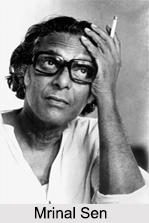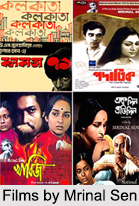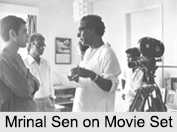 Mrinal Sen was a Bengali Film Director who is generally thought of as a pioneer of the Parallel Cinema movement in India. He has made films in Bengali, Oriya, Telugu and Hindi languages. He was one of the nation"s most politically active filmmakers. Mrinal Sen, along with his contemporaries Satyajit Ray and Ritwik Ghatak, was considered a doyen of regional parallel cinema internationally.
Mrinal Sen was a Bengali Film Director who is generally thought of as a pioneer of the Parallel Cinema movement in India. He has made films in Bengali, Oriya, Telugu and Hindi languages. He was one of the nation"s most politically active filmmakers. Mrinal Sen, along with his contemporaries Satyajit Ray and Ritwik Ghatak, was considered a doyen of regional parallel cinema internationally.
Early Life of Mrinal Sen
Mrinal Sen was born on 14 May 1923, in Faridpur, East Bengal (now Bangladesh). He studied physics at the renowned Scottish Church College, Kolkata and then at the University of Calcutta. During his student life, he got actively involved with the cultural wing of the Communist Party of India, but he never became a member of the same. He associated himself with socialist Indian People`s Theatre Association (IPTA) which helped him immensely to get closer to like-minded people.
Career of Mrinal Sen
Mrinal Sen, before beginning his film career, worked as a medical representative, journalist, and in a sound recording studio. Due to his work commitments he often had to leave Kolkata. His deep interest in cinema grew after he came across a book on film aesthetics. Soon he left his job as a medical representative and came back to Kolkata.
Mrinal Sen made his directorial debut in 1956 with the Bengali film "Raatbhor". He followed it up with the successful "Neel Akasher Neechey" in 1958, an ambitious film that attempted to link the nationalist movement in India to the Chinese struggle against Japanese imperialism. Mrinal Sen"s reputation as a director was established with the disturbing "Baishey Shravan" (1960) set in a Bengal village during the 1943 famine, and "Akash Kusum" (1965). Some of his finest work in Bengali came in his Kolkata trilogy: "Interview" (1970), "Calcutta 71" (1972) and "Padatik" (1973).
 Mrinal Sen"s first Hindi film was the low-budget "Bhuvan Shome". A comic tale about a rigid bureaucrat"s reformation by an irreverent village woman, the film brought into focus the rigidity of class and social barriers. The unorthodox style of its visuals and editing had a major influence on the rise of Parallel Cinema in India. His next film in Hindi, "Ek Adhuri Kahani", was about the oppression of factory workers by their middle and upper-class bosses. In 1976, Mrinal Sen made "Mrigaya". Set in the period before Indian Independence, the film told a subtle tale of the colonial rules that came in contact with the world of the Santhal tribes.
Mrinal Sen"s first Hindi film was the low-budget "Bhuvan Shome". A comic tale about a rigid bureaucrat"s reformation by an irreverent village woman, the film brought into focus the rigidity of class and social barriers. The unorthodox style of its visuals and editing had a major influence on the rise of Parallel Cinema in India. His next film in Hindi, "Ek Adhuri Kahani", was about the oppression of factory workers by their middle and upper-class bosses. In 1976, Mrinal Sen made "Mrigaya". Set in the period before Indian Independence, the film told a subtle tale of the colonial rules that came in contact with the world of the Santhal tribes.
In the 1980s, Mrinal Sen turned from overtly political narratives to examining the seemingly more conventional theme of middle-class life. However, films such as "Ek Din Achanak" also reflected a deep dissatisfaction with the status quo.
In most of Mrinal Sen"s work from "Punascha" to "Mahaprithibi", the city of joy - Kolkata features significantly. He has depicted Kolkata as a spirit and as a motivation. He has beautifully woven the value system, class difference, roads and most importantly the people of the city into his art of cinema and coming of age for Kolkata.
 Awards and Achievements of Mrinal Sen
Awards and Achievements of Mrinal Sen
National Awards for Best Direction in Bhuvan Shome (1969), Ek Din Pratidin (1979), Akaler Sandhane (1980) and Khandhar (1983).
Best Screenplay for Padatik (1973), Akaler Sandhane (1980) and Kharij (1982).
Filmfare Critics Award for Best Film in Mrigayaa (1976).
Filmfare Best Screenplay for Khandhar (1983).
Mrinal Sen has also garnered many awards at international level as well. His film have received awards from almost all major film festivals, including Cannes, Berlin, Venice, Moscow, Karlovy Vary, Montreal, Chicago and Cairo. Apart from his films, he has also received a number of personal honours. He received the Padma Bhushan Award by the Government of India in 1981, Dadasaheb Phalke Award in 2003 and Life Time Achievement award in 2012 at 5th Global Film Festival Noida.
The French government awarded him the Commander of the Order of Arts and Letters, the highest honour conferred by the country. In 2001 The Russian government honoured him with the Order of Friendship.
Filmography of Mrinal Sen
The Filmography of Mrinal Sen is as follows:
Raatbhor (1955)
Neel Akasher Neechey (1958)
Baishey Sravan (1960)
Punascha (1961)
Abasheshe (1963)
Pratinidhi (1964)
Akash Kusum (1965)
Matira Manisha (1966)
Bhuvan Shome (1969)
Interview (1971)
Ek Adhuri Kahani (1971)
Calcutta 71 (1972)
Padatik (1973)
Chorus (1974)
Mrigayaa (1976)
Oka Oori Katha (1977)
Parasuram (1978)
Ek Din Pratidin (1979)
Akaler Sandhane (1980)
Chalchitra (1981)
Kharij (1982)
Khandhar (1983)
Genesis (1986)
Ek Din Achanak (1989)
Mahaprithivi (1991)
Antareen (1993)
Aamaar Bhuvan (2002)
Short Films of Mrinal Sen
The Short Films of Mrinal Sen is as follows:
Ichhapuran (1970)
Tasveer Apni Apni (1984)
Aparajit (1986-87)
Kabhi Door Kabhi Paas (1986-87)
Swamvar (1986-87)
Aina (1986-87)
Ravivar (1986-87)
Aajkaal (1986-87)
Do Bahene (1986-87)
Jit (1986-87)
Saalgira (1986-87)
Shawl (1986-87)
Ajnabi (1986-87)
Das Saal Baad (1986-87)
Documentaries of Mrinal Sen
The Documentaries of Mrinal Sen is as follows:
Moving Perspectives (1967)
Tripura Prasanga (1982)
City Life - Calcutta My El Dorado (1989)
And the Show Goes On - Indian Chapter (1999)
Books Written by Mrinal Sen
A keen autodidact, Mrinal Sen has read widely on films and later published several books on cinema including "Views on Cinema" (1977) and "Cinema; Adhunikata" (1992). In the year 2004, Mrinal Sen published his autobiography titled "Always Being Born".
Personal Life of Mrinal Sen
Mrinal Sen was married to Gita Shome who expired in 2017 and the couple together had a son named Kunal Sen. Mrinal Sen died on 30 December 2018 at the age of 95 years in Kolkata. Mrinal Sen had been suffering from age related ailments for a long time.






